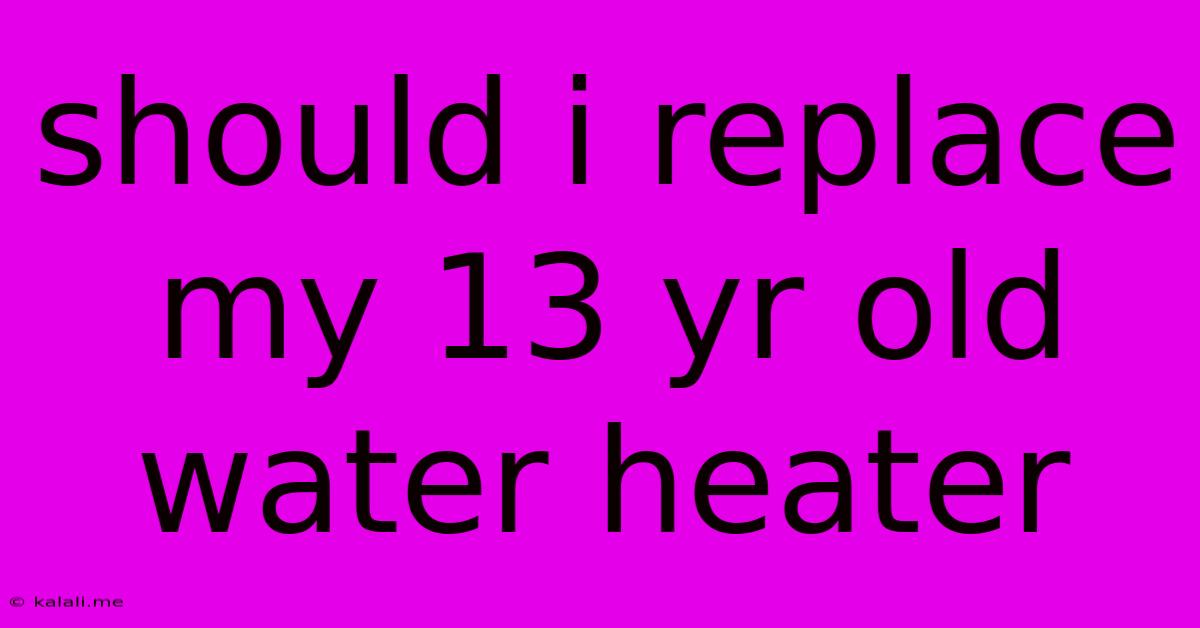Should I Replace My 13 Yr Old Water Heater
Kalali
Jun 04, 2025 · 3 min read

Table of Contents
Should I Replace My 13-Year-Old Water Heater? A Comprehensive Guide
Meta Description: Is your 13-year-old water heater on its last leg? This guide helps you determine if replacement is necessary, considering factors like energy efficiency, repair costs, and potential problems. Learn how to assess your situation and make the best decision for your home and budget.
Deciding whether to replace your aging water heater is a significant home maintenance decision. A 13-year-old water heater is well past its average lifespan, which typically ranges from 8 to 12 years for conventional tank water heaters and even longer for tankless models. While it might still be functioning, several factors need consideration before you decide to keep it running or invest in a replacement. This guide will help you weigh the pros and cons to make an informed decision.
Signs Your Water Heater Needs Replacing
Several warning signs indicate that your 13-year-old water heater is nearing the end of its life or is already experiencing significant problems. These include:
- Frequent repairs: If you've had multiple repairs in the past year or two, the cost of those repairs might exceed the cost of a new, more efficient water heater. This is a strong indicator it's time for a replacement.
- Rusty or cloudy water: This often points to sediment buildup within the tank, which can lead to further corrosion and eventual tank failure. A significant leak is a major risk associated with this problem.
- Strange noises: Popping, rumbling, or banging sounds coming from your water heater suggest internal problems, such as sediment buildup or a failing heating element. These noises are warning signs of potential water heater failure.
- Leaking: Any leakage, no matter how small, is a serious problem. Water damage can be costly to repair, and a leaking tank poses a significant risk of flooding.
- Insufficient hot water: If you consistently run out of hot water before everyone in your household has had a shower, it might be time for an upgrade to a larger capacity water heater or a replacement altogether.
- Increased energy bills: Older water heaters are significantly less energy-efficient than newer models. A noticeable spike in your energy bills could indicate that your old water heater is working harder and consuming more energy to heat the water.
- Age: As mentioned earlier, a 13-year-old water heater is well beyond its average lifespan. Even without immediate problems, its efficiency is likely declining, leading to higher utility costs and an increased risk of failure.
Cost vs. Benefit Analysis: Repair or Replace?
Before deciding to replace your water heater, consider the cost of repair versus replacement. A minor repair, such as replacing a faulty thermostat, might be cost-effective. However, if the repair is extensive or involves replacing major components like the heating element or the anode rod, the cost might approach or even exceed the price of a new water heater. Consider the long-term savings associated with energy-efficient models when making this assessment.
Choosing a Replacement Water Heater
If you decide to replace your water heater, consider these factors:
- Tank vs. Tankless: Tankless water heaters provide endless hot water on demand and are more energy-efficient, although they often have a higher upfront cost. Tank water heaters are more affordable initially but less energy-efficient in the long run.
- Energy Source: Electric, gas, and heat pump water heaters each have pros and cons regarding efficiency, installation, and cost. Consider your local energy prices and environmental impact when making this decision.
- Size and Capacity: Choose a water heater with a capacity that meets your household's hot water demands.
Replacing a 13-year-old water heater is often a worthwhile investment. The potential for costly repairs, water damage, and the savings from improved energy efficiency make replacement a smart long-term solution for most homeowners. By carefully evaluating the factors discussed above, you can make the best decision for your home and budget. Remember to always consult with a qualified plumber for professional advice and installation.
Latest Posts
Latest Posts
-
Bread Machine Yeast Vs Instant Yeast
Jun 06, 2025
-
Cooking Burgers In Water On Stove
Jun 06, 2025
-
Hanging Pictures On A Concrete Wall
Jun 06, 2025
-
Do Not Bear False Witness Meaning
Jun 06, 2025
-
Heat Pump Water Heaters Vs Gas Water Heaters
Jun 06, 2025
Related Post
Thank you for visiting our website which covers about Should I Replace My 13 Yr Old Water Heater . We hope the information provided has been useful to you. Feel free to contact us if you have any questions or need further assistance. See you next time and don't miss to bookmark.